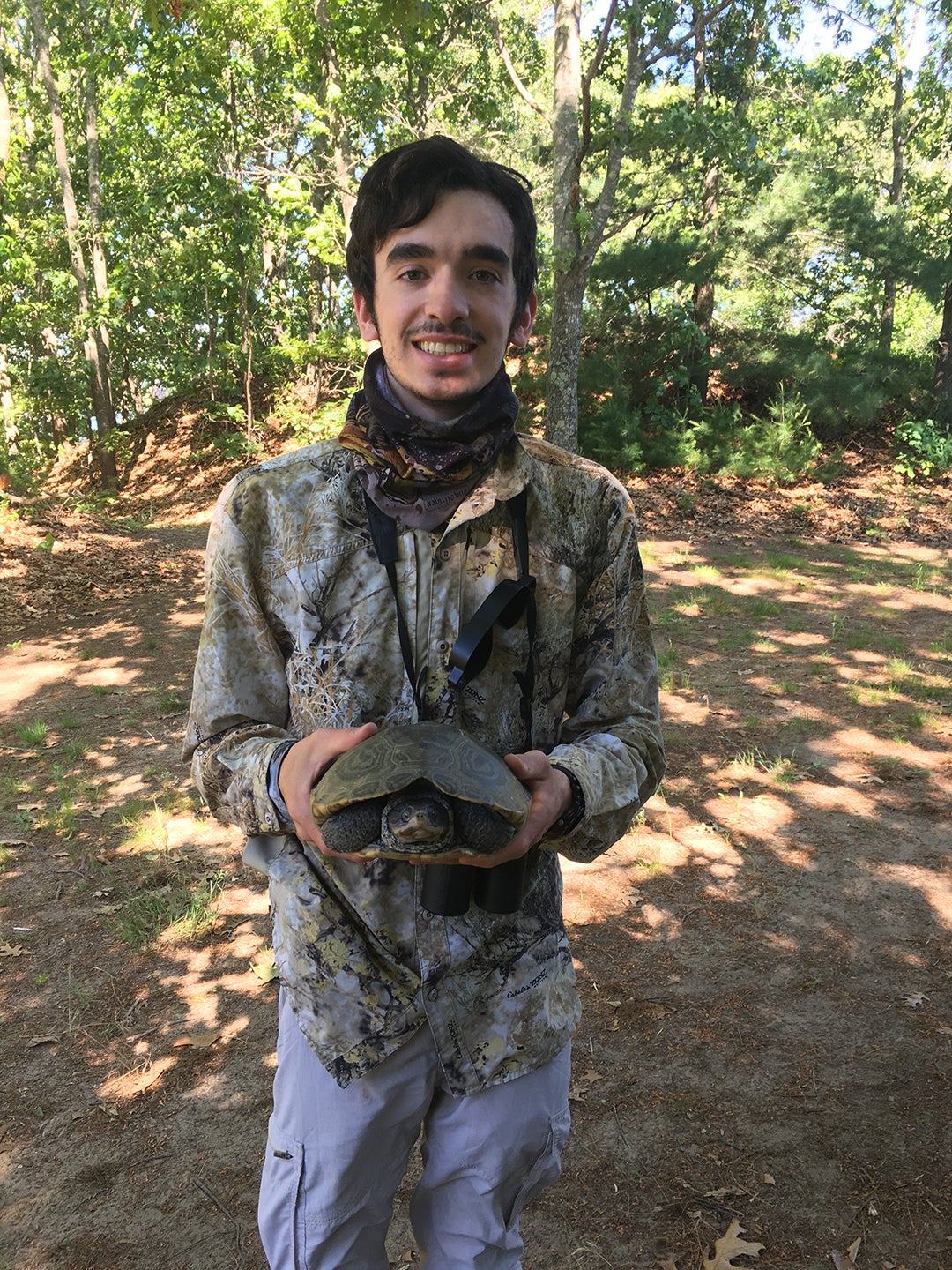KINGSTON, R.I. – July 1, 2020 – As soon as the late morning sun peeked from behind the clouds, diamondback terrapins emerged from a Barrington forest and salt marsh and began to wander around a dry meadow. Within minutes, a team of biologists, volunteers and students – including University of Rhode Island rising junior Richard Mercer – quietly began observing as five of the Ocean State’s rarest turtles dug nests in the sandy soil, laid their eggs and prepared to depart.
Before the turtles could escape, however, Mercer and others marked the nest locations and captured the turtles to identify them, insert an electronic tag into their leg, and collect other data before releasing them on their way. The whole painless process took less than 15 minutes.
A resident of Pawcatuck, Connecticut, Mercer is spending his summer as a URI Coastal Fellow studying the conservation of rare reptiles and amphibians in Rhode Island. In addition to tracking the terrapins, he is surveying the state for eastern box turtles, documenting road mortality of turtles, snakes and frogs, and searching for evidence of breeding by eastern spadefoot toads. On each project, he collaborates with URI graduate students, as well as with faculty advisor Nancy Karraker and Rhode Island Department of Environmental Management herpetologist Scott Buchanan.
“I like learning about the ecosystems and different populations of various animals,” said Mercer, a double major in biological sciences and marine affairs. “Instead of just studying one species, I’m enjoying learning about the conservation of many different species and how we can make sure that humans aren’t completely altering their populations.”
Mercer has had a lifelong interest in wildlife, and he especially enjoys nature photography, fishing and exploring local ecosystems. His interest was piqued as a sophomore in high school when he began volunteering with DEM on a variety of wildlife projects, from banding ducks and geese to monitoring traps for black bears.
The summer before enrolling at URI, he interned at Mystic Aquarium to learn about fish and other aquatic creatures and to rehabilitate injured seals. But of all of his wildlife adventures so far, he is enjoying the diamondback terrapin project the most.
“There are a lot of questions about their nesting activity and habitat usage,” he said, “and I want to help figure out some of the answers. I want to look at the difference in success of early nests versus later nests and where those hatchlings spend their first winter.”
To do so, he is helping document as many nests as possible, installing wire nest guards to deter predation, and using trail cameras to determine if some terrapins nest after dark. In August and September, he will return to observe the hatching success of each nest and help track where the young turtles go.
“Richard has been amazing, helping with all aspects of our nesting season,” said Kathryn Beauchamp, who leads the terrapin project for the Barrington Land Trust. “He has such dedication to his internship, learns quickly and works independently within our team. He has a bright future ahead of him, and we look forward to having him back again during hatchling emergence.”
Mercer’s summer research is supported by the URI Coastal Fellows Program, a unique initiative designed to involve undergraduate students in addressing current environmental problems. Now in its 24th year, the program pairs students with a mentor and research staff to help them gain skills relevant to their academic major and future occupations.
As he looks toward his future career, Mercer said he plans to attend graduate school and eventually work as a conservation biologist for a university or government agency. But he hasn’t yet narrowed down where he wants to work or what kind of animals he intends to study.
“I really just want to gain as much experience as I can with as many different animals as possible so I can understand more about their conservation status,” he said. “I’ll figure out my long-term plan later.”

